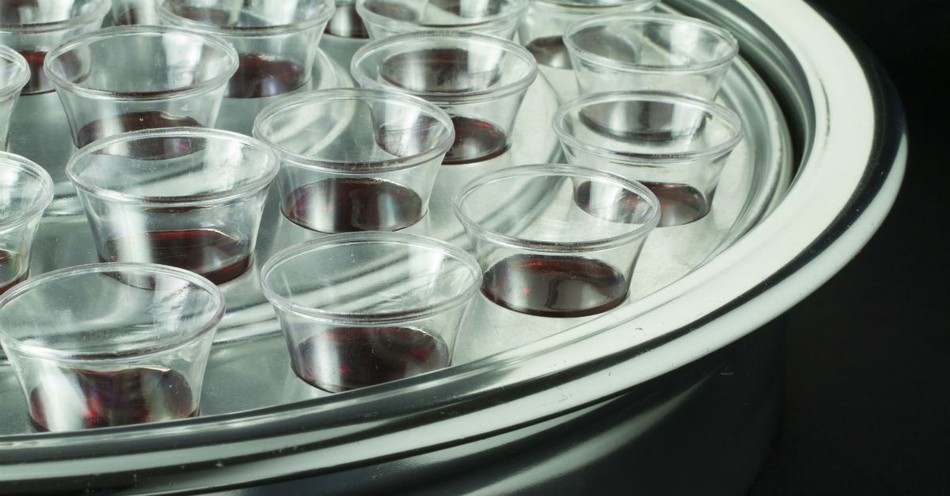Depending on the denomination of the you’ve attended, you might have seen a great deal of debate arise over this issue. During the sacrament of Communion (Lord’s Supper, or Holy Eucharist), some congregations will strictly use grape juice and avoid alcohol altogether. Others will offer wine in a communal cup or in small plastic cups for individual church members. And other churches may offer both wine and grape juice, available for those under 21 or those who prefer to avoid drinking alcohol.
This article will attempt to give an overview of the positions for and against the use of wine in Communion and provide a possible answer to this question that seems to divide churches.
Two Arguments for Offering Grape Juice in Communion
Offering grape juice instead of alcoholic wine in Communion began in the mid-late 19th century, according to Christianity Today. Those who advocate for grape juice at communion may assert one of the following arguments.
1. Offering Wine Is Insensitive to Those Struggling with Alcoholism.
It can help those who struggle with alcoholism. Those who may be tempted by alcohol may avoid half of communion, and not engage fully with the sacrament in order to avoid tempting oneself. As seen in Scripture, wine can lead to sin (Genesis 9).
In a day and age where alcohol is so readily available and over-abused in American culture, non-fermented wine (grape juice) can be used as an alternative in Communion to the traditional, alcoholic wine.
To avoid the issue of church members not taking part in Communion to avoid consuming something that tempts them, grape juice can be used.
2. The Wine Jesus Drank Isn’t the Same as Modern Wine.
According to this thesis by Crown Covenant Church, Scripture refers to the liquid used in Communion as the fruit of the vine and the cup (Matthew 26:26-30, Mark 14:22-26, Luke 22:18-20). Just as we don’t eat bread exactly the same way as they did in Jesus’ time—the article speaks about using olive oil for the bread—we can conclude the same about not having fermented fruit of the vine at communion.
Even if the wine Jesus was fermented, we must keep in mind the alcoholic content in ancient times was far lower than the percentage of alcoholic content we see in wines today.
Two Arguments for Offering Wine in Communion
On the flip side of the argument, there are certain churches who advocate for sticking with the traditional use of wine during Communion.
1. Offering Wine during Communion is a More Historically Accurate Church Practice.
To maintain historical accuracy of the Lord’s Supper and the practices of the church, traditionally wine has been used throughout centuries. Jesus used wine during the institution of the Lord’s Supper, one of the most important sacraments in the church today (Luke 22:18).
2. Scripture References Alcohol Positively More Frequently than it Does Negatively.
Scripture does have several passages which highlight the positive uses of wine. For instance, Jesus’ first miracle turned water into wine (John 2:1-11). Joel 3:18 describes wine dripping down a mountain in a very positive tone. We have to keep in mind Jesus did, in fact, drink wine during his ministry. Even if he refers to the cup as “the fruit of the vine,” what was contained in that cup for that specific rendering of the sacrament was, in fact, wine.
According to What Would Jesus Drink (as highlighted in a blog post here), of the 247 references in Scripture to alcohol: 40 are negative, 145 positive, and 62 neutral. The positive far outweighs the negative.
Wine is a gift from God. Like all gifts, if we abuse them, we can turn something good into something very bad. For instance, a worship leader may have the gift of music. He or she can either use it to glorify God or abuse it and become prideful. In the same way, we can use wine to glorify God or abuse it.
Which One Should We Use? Grape Juice or Wine?
Churches have missed the point of the sacrament if they’ve gotten divided over whether believers should consume grape juice or alcohol on Sundays. No matter what is in the cup (grape juice or wine), keep in mind what it represents: Jesus’ blood shed for us (Luke 22:20).
Churches don’t seem to divide much over the other element of communion: the bread. But for Passover, Jewish people typically ate unleavened bread. Quite a few of the churches I have attended served very-much leavened bread during Communion. Just because we don’t maintain the historical accuracy doesn’t make the practice of Communion any less valuable.
On the flip side, we must keep in mind, historically, wine was used in Jesus’ time and during the early church. Granted, one can make arguments about the difference of alcoholic content in ancient wine versus the wines we have available today.
Overall, it all comes down to the convictions of the church you attend. Since the choice of whether a church uses wine or grape juice doesn’t fall under the category of essentials for salvation, we must allow leeway for churches that choose to use one over the other because of their convictions.
If, at your own church, you find the elements distracting, consider consulting with your pastor about the possibility of incorporating wine or grape juice, whichever there is a dearth of. For instance, if you don’t want to tempt yourself with alcohol, ask if the staff would consider offering grape juice for those who want to avoid drinking wine.
Photo Credit: Getty/matchefoto

.jpg)

